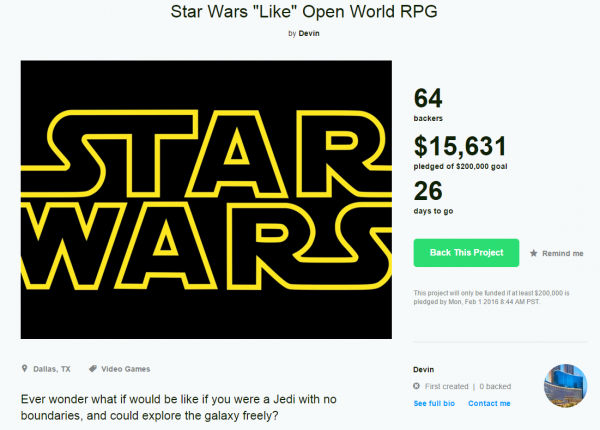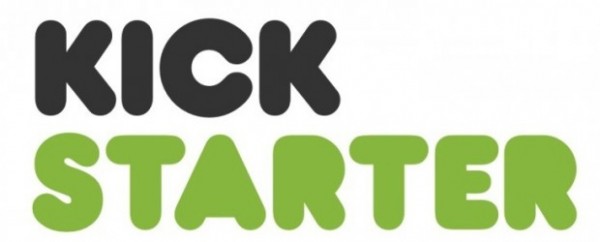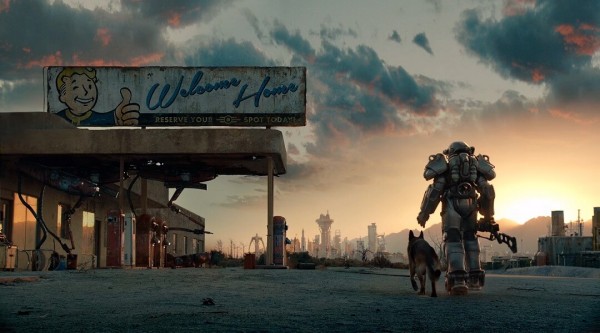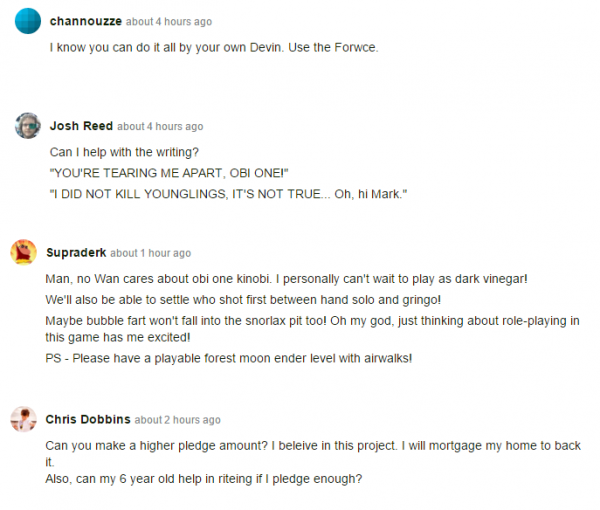
A new game has been announced on Kickstarter. It’s an expansive, open world RPG in the Star Wars universe with graphics rivaling Star Wars: Battlefront and “with the feel of The Witcher 3“. The game is set to launch December 2017 if its funding goal of $200,000 is met within the next 26 days. Development has yet to start, the team has not yet been formed, and licenses have not yet been acquired.
If you could not contain your laughter upon reading the last paragraph, congratulations, you may have a sane understanding of video game development.
While Kickstarter and other crowdfunding sites have been an amazing resource for game developers requiring additional resources to complete their games, it also has been a breeding grounds for false promises, poorly managed development and even theft. Few developers using crowdfunding are outright malicious, but there are countless who try their hardest and still cannot produce the game they thought that they could on the budget they planned.

Most products on Kickstarter are fully developed or close to fully developed, and require money for manufacturing. However, for the more artistic projects, documentaries, movies, and, of course, video games, the development is the main part of their costs and, thus, they require funding to complete the product itself.
Video game development is hard.
It’s really hard to make a video game. REALLY hard. It is an intersection of design, art and technology where rules only work if they “feel” right and you find yourself juggling so many technical components that bugs seem to spontaneously appear from thin air. Even top industry professionals that work at AAA studios have an entire department at Microsoft dedicated to making their games actually run on the Xbox.
Not only is game development a technical nightmare, but ensuring by the end of the whole process the game is still fun and is pleasing to your fans is no small task. Combine those tasks with general marketing, press relations, community management, business development, taxes and hundreds of other parts required to manage a game development studio, and it becomes quickly apparent why so many games, both indie and AAA never reach completion.
Even Blizzard, one of the most respected game studios in the world, canceled one of their own projects after seven years of development due to it failing to be “fun”.
So let’s take a look at this “Star Wars Open World RPG” and its creator, Devin Tripp. According to his Kickstarter biography, Devin is “20 years old and [has] owned businesses ranging from clothing to stocks”. I am not sure what a “stocks” business would be in this context, but I think it is safe to assume that Devin has never developed a video game in his life.
Now, kudos to Devin to putting his heart and passion into setting up this Kickstarter. It is great to see someone want to direct their passion into creating something of value for the gaming community. However, Devin seems fairly misguided in his beliefs about time, effort and costs of developing a video game. Putting spelling mistakes, lack of vision and legal issues aside, I want to address how absurd this Kickstarter and its goals are.
Devin references Fallout 4 and The Witcher 3 multiple times in his Kickstarter’s description as examples of the game that he wishes to develop. Both of these games have actually prided themselves on their reduced costs. CD Projekt Red spent just over $32 million on the creation of The Witcher 3 (not including marketing). That is 160 times more than Devin planned to spend on the development of his game and does not include the additional costs for building the initial team. CD Projekt Red’s team size for The Witcher 3 was just over 200 people, still much larger than Fallout 4‘s team of just over 100 people.

Let’s say that Devin tries the Fallout 4 approach and hires 100 people, who all start today to finish the game in two years, by his December 2017 delivery promise. At $200,000, that would pay each developer $1000/year or about $2.80 cents per day (assuming they get some unpaid vacation).
Devin will probably have a hard time finding industry experts available to work at that rate, so let us calculate the costs the opposite direction. One rule of thumb I have learned is that a full time employee in the game industry is expected to cost the studio approximately $10,000 each month. Unfortunately, that rate would leave Devin only with the ability to hire… well, 0.83 of a developer for two years, before subtracting Kickstarter and credit card fees.
Okay, so instead of hiring a professional, Devin will hire three students out of college, a programmer, a game designer/writer and an artist. They will each make $30k/year and Devin will have a team of three to complete his open world Star Wars RPG. The average full-time employee works 2088 hours per year, but Devin will pick up a role on the team and the four of them will manage to work a brutal 80 hours per work for two years straight, giving them 33,280 man hours to complete the game.
In comparison, Fallout 4 was in development since Fallout 3 launched, but only had a full team since the last Skyrim DLC was launched on Feburary 12th, 2013, which mean their 100 person team contributed at least 556,800 hours, which is at least 16.7 times the amount of hours Devin and his untrained team could put towards the game.
Unfortunately for Devin, it would appear that unless his Kickstarter greatly exceeds its goal amount, it is very unlikely that he will be able to complete the game that he has promised his backers.

It is easy to take a shot at Devin here. He is a young, naive hopeful with poor spelling and unplanned goals. The comment section of his Kickstarter is rife with sarcasm and jokes at his expense. Though this might be an extreme example, he does highlight something that the Kickstarter community and game community are often guilty of— underestimating the cost and efforts that go into developing a game.
There is no one entity to blame here: Many larger projects go to Kickstarter for initial funds, but actually receive many times more from publishers to complete their game, giving backers a false sense of development costs. Many backers do not research into the developers on the team and their experience, expecting to receive a game for sure because the project reached their minimum funds request. Many developers do not plan their costs well and run out of money before the game is complete. And, sometimes, just shit happens.
So enjoy a laugh over this project, but keep it in mind the next time you look at another Kickstarter project. Maybe that poor indie team asking for $60k isn’t asking for too much after all.
